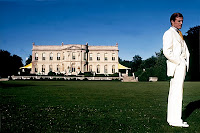Three questions to ask when you don't know your plot from your story

"The story is the journey for truth. The plot is the road it takes to get there." - Peter Dunne.
Ever known exactly what is going to happen in a scene and yet when you sit down to write it you don't know what the hell to write? That scene you thought was going to be so easy because you had it all plotted out? Why is that?
Quite possibly it's because you don't know your story from your plot.
Defining plot is simple. Socrates called it the 'structure of the incidents' – E.M. Forster described it more simply as 'what happens'. Coming up with a heap of interesting events is easy – what's hard is combining those events into something meaningful, so that one event is a natural and believable consequence of the preceding one – this is what gives a good 'structure of incidents' its narrative propulsion. This is when a plot becomes a story – hence Forster's distinction that plot is what happens, and story is why it happens.
But there's more to a story than why – there's who – who is in the midst of this plot and how are they reacting to it. Peter Dunne, in his accessible and highly recommended book Emotional Structure: Creating the Story beneath the Plot goes further and describes story as what the plot does to the person it's happening to.
So, it's all very well knowing the what, but if we don't know the why or the who, we're screwed. Which brings me back to my original question...
I hit a scene in the short story I'm currently working on that should have been dripping with dramatic potential and yet when it came to it I couldn't take it anywhere. It took me two nights of producing one insipid little paragraph for me to realise I didn't know what the hell I was doing. The problem was, I didn't know the who.
Whenever I get stuck like that I get my trusty Moleskin out and write down the questions I need to answer so that I can finish the WIP while I'm still young enough to breathe. Here are the three questions that got me out of the mess:
What do these characters want?
Which basically means – develop or research your characters so you know them well enough to know how they would react when the what starts happening.
Why do they want it?
This is the background – the character history and make-up that justifies and explains their wants. This will make them believable, whole, and perhaps more importantly, provide further dramatic potential and story threads.
What is the point of conflict in this scene?
Or rather – why the hell am I bothering to write this scene at all? A good rule of thumb – if shit-all happens in a scene, it's a shit scene. The conflict can be external (what), internal (who) – but preferably both i.e. when internal conflict is brought to dramatic fruition by external events. The ideal scene is when the what, why and who are all fused together and that's when a scene starts to write itself.
Problem solved.


This breaks it down so simply and clearly - excellent post.
ReplyDeleteSome scenes are definitely harder to write than others. When I'm struggling getting started - something is usually off. Great post.
ReplyDelete@Girl Friday - thanks Friday - (can I call you Friday??) This blog is a great place to centralize my writing notes and lessons learned and I'm delighted when other people find it interesting or of use.
ReplyDelete@Laura - thanks, Laura - I appreciate the read. Notice your blog is going great guns - well done.
Great post, James. And, yes, I do that scribbling Self questions thing too - it's remarkably effective!
ReplyDelete(I also find asking questions of my dumb dogs, out loud, equally useful)
Shared on my tumblr. http://ourladyofashes.tumblr.com/post/3606169385/james-killicks-blog-three-questions-to-ask-when-you
ReplyDeleteHelpful blog! I'm in the middle of plot changes per my publishing editor. Pulled out a string that unraveled most of my hero's scenes, since his motive changed. Thanks for the inspiration!
ReplyDeleteOh, yes. It's all about the characters. If it's just a bunch of stuff happening, without any conflict for the characters, then it's just a bunch of stuff happening. I'm forever asking myself "Why is the character doing this instead of that?"
ReplyDeleteTerry
Terry's Place
Romance with a Twist--of Mystery
Thanks James - a really thought provoking post and very helpful. I have ordered Mr Dunne's book thanks to you!
ReplyDelete@Sandie - Hey, Sandie - great to hear from you again. Thanks for dropping by and commenting. Writing questions is such a good way to think yourself out of writing problems. Talking to the dogs isn't such a bad idea either, although it would have to be the cat in my case.
ReplyDelete@Lexx - thanks for sharing.
@Dianne - glad to be of help - you must be doing something right if your character and plot is so tightly woven. Well done.
@Terry Hey Terry, how's it going? You can always tell when a character has been compromised to fit the plot.
@Henrietta - Thanks for commenting, Henrietta and welcome to the blog. I hope you get on with Mr Dunne's book - let me know what you think.